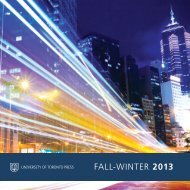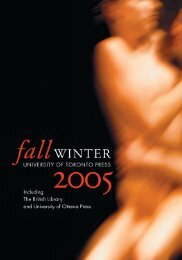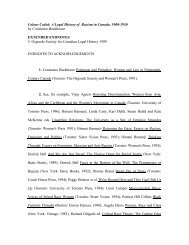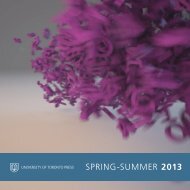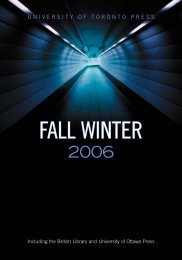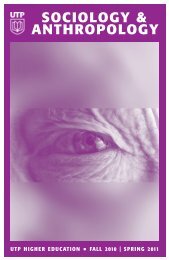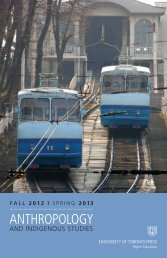Classics, Medieval & Renaissance 2012 - University of Toronto ...
Classics, Medieval & Renaissance 2012 - University of Toronto ...
Classics, Medieval & Renaissance 2012 - University of Toronto ...
Create successful ePaper yourself
Turn your PDF publications into a flip-book with our unique Google optimized e-Paper software.
ERASMUS<br />
NEW<br />
The Correspondence <strong>of</strong> Erasmus<br />
Letters 1926–2081<br />
Translated by Charles Fantazzi<br />
Annotated by James M. Estes<br />
The predominant theme <strong>of</strong> the letters <strong>of</strong> 1528 is<br />
Erasmus’ controversies with a variety <strong>of</strong> critics and<br />
opponents. The publication in March <strong>of</strong> the dialogue<br />
Ciceronianus, for example, provoked a huge uproar<br />
in France because it included an ironic jest that was<br />
considered insulting; more serious were the<br />
continuing efforts <strong>of</strong> conservative Catholics in<br />
France, Italy, and to prove not only that Erasmus was<br />
a secret Lutheran but also that humanist scholarship<br />
was the source <strong>of</strong> the Lutheran heresy.<br />
In response to these charges, Erasmus wrote<br />
letters and books in which he vigorously defended<br />
his orthodoxy and assiduously cultivated the support<br />
<strong>of</strong> his many admirers among the princes and prelates<br />
<strong>of</strong> Europe. The letters also record Erasmus’ growing<br />
anxiety over the progress <strong>of</strong> the Reformation in<br />
Basel, his diligent attention to his financial affairs,<br />
and his progress on the great editions <strong>of</strong> Augustine<br />
and Seneca that would be published in 1529.<br />
(Collected Works <strong>of</strong> Erasmus 14)<br />
624 pp / 25 illustrations / 6 ¾ x 9 ¾ / 2011<br />
Cloth 978-1-4426-4044-3 $175.00 (£122.99)<br />
Expositions <strong>of</strong> the Psalms<br />
Edited by Dominic Baker -Smith<br />
This third and final volume <strong>of</strong> the Expositions <strong>of</strong> the<br />
Psalms comprises Erasmus’ commentary on Psalms<br />
14, 38, and 83. Dating from the final years <strong>of</strong> Erasmus’<br />
life, the commentaries reflect his later thoughts on<br />
the great crisis facing western Christendom.<br />
These three expositions, written during the early<br />
1530s, address a number <strong>of</strong> contentious issues<br />
within the Church and attempt to reconcile the<br />
warring factions <strong>of</strong> the Reformation. Erasmus’<br />
characteristic emphasis on the inner experience <strong>of</strong><br />
faith, rather than rigid outward conformity to religious<br />
dogma, allowed him to be receptive to the insights<br />
<strong>of</strong> reform while refusing to compromise on the<br />
essentials <strong>of</strong> Christian doctrine. By stressing the<br />
subjective experience at the heart <strong>of</strong> spiritual practice,<br />
he sought to reduce the tension <strong>of</strong> institutional<br />
conflict. The volume includes the first published<br />
English translation <strong>of</strong> the exposition <strong>of</strong> Psalm 38<br />
and, since 1537, <strong>of</strong> Psalm 14.<br />
Dominic Baker-Smith is pr<strong>of</strong>essor emeritus <strong>of</strong><br />
English Literature at the <strong>University</strong> <strong>of</strong> Amsterdam.<br />
(Collected Works <strong>of</strong> Erasmus 65)<br />
352 pp / 3 illustrations / 6 ¾ x 9 ¾ / 2010<br />
Cloth 978-0-8020-9979-2 $110.00 (£76.99)<br />
NEW<br />
The Unfolding <strong>of</strong> Words<br />
Commentary in the Age <strong>of</strong> Erasmus<br />
Edited by Judith Rice Henderson<br />
Leading sixteenth-century scholars such as Martin<br />
Luther and Desiderius Erasmus used print technology<br />
to engage in dialogue and debate with authoritative<br />
contemporary texts. By what Juan Luis Vives termed<br />
‘the unfolding <strong>of</strong> words,’ these humanists gave old<br />
works new meanings in brief notes and extensive<br />
commentaries, full paraphrases, or translations. This<br />
critique challenged the Middle Ages deference to<br />
authors and authorship and resulted in some <strong>of</strong> the<br />
most original thought – and most violent controversy<br />
– <strong>of</strong> the <strong>Renaissance</strong> and Reformation.<br />
The Unfolding <strong>of</strong> Words brings together international<br />
scholarship to explore crucial changes in writers’<br />
interactions with religious and classical texts. This<br />
collection focuses particularly on commentaries by<br />
Erasmus, contextualizing his Annotations and<br />
Paraphrases on the New Testament against broader<br />
currents and works by such contemporaries as<br />
François Rabelais and Jodocus Badius. The Unfolding<br />
<strong>of</strong> Words tracks humanist explorations <strong>of</strong> the<br />
possibilities <strong>of</strong> the page that led to the modern<br />
dictionary, encyclopedia, and scholarly edition.<br />
Judith Rice Henderson is a pr<strong>of</strong>essor in the Department<br />
<strong>of</strong> English and is active in the Classical,<br />
<strong>Medieval</strong>, and <strong>Renaissance</strong> Studies Program at the<br />
<strong>University</strong> <strong>of</strong> Saskatchewan.<br />
(Erasmus Studies)<br />
Approx. 272 pp / 16 illustrations / 5 ¾ x 9 / July <strong>2012</strong><br />
Cloth 978-1-4426-4337-6 $65.00 (£42.99)<br />
14 <strong>University</strong> <strong>of</strong> <strong>Toronto</strong> Press




